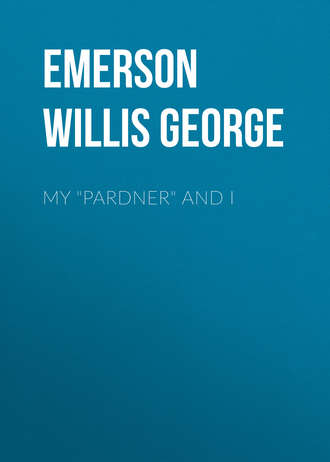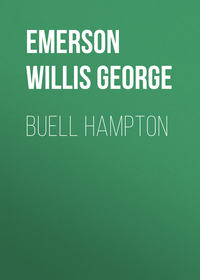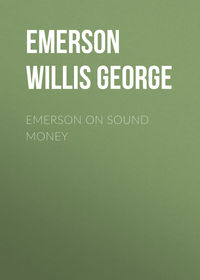 полная версия
полная версияMy "Pardner" and I
“Is this a map of the town?” asked Miss Virgie Bonifield, rising and approaching a map that hung on the wall near where Marcus Donald was seated.
“Yes, that is one of the best maps that has ever been gotten out,” said Marcus Donald, adjusting his gold-rimmed spectacles.
“And where is Eagle’s Addition?” Marcus Donald pointed it out.
“And what are you selling lots for in that part of town?”
“Well, really, Miss Bonifield,” said Donald, stammering a little, “we haven’t been selling very many lots – that is, not recently. I will refer you to Mr. Winthrop; he has charge of all such matters, and perhaps he can give you better advice than I can.”
“But what do you advise in regard to investments in Waterville?” she asked, abruptly.
“Oh, you know we believe in Waterville, Miss Bonifield; we believe it is destined to be one of the greatest cities in the United States. Of course there has not been any marked activity during the past winter, but we are expecting business to open up well, most any time now.”
She turned to Winthrop, and seating herself beside his desk, asked him to point out what he considered one of the most desirable corners in Eagle’s Addition. Usually Winthrop prided himself on his ability to make sales of lots, and he was quite willing to sell to anybody rather than the woman by his side. He had been so hard pressed for ready-money during the winter and spring that he had shut himself out, so to speak, from all society, for the reason that he was destitute of even spending money of the most ordinary character. After studying some time, he put his pencil reluctantly down on the map and said:
“I consider these lots as desirable as any in Eagle’s Addition.”
“And what are you selling them for?”
“We are asking $100 a lot,” said he, “but we are not selling any just now, Miss Bonifield, at all.”
She looked at the map a few minutes, and then said, “You think these are about the best lots in the Addition, do you?”
Winthrop almost inaudibly assented. “Well, no – hardly – Miss Bonifield; the fact is,” he faltered, “we do not care to make any sales at the present time. We are rather expecting some information a little later; we – we expect to hold a Town Company meeting, and may conclude to reduce the price of lots – and – ”
“Or you may raise the prices,” said she, looking archly at Homer. “Is it not so.”
“P – possibly,” replied Winthrop.
“Well, I wish to purchase four lots on the corner you have indicated. Here is the money,” said she, laying down a roll of bills on his desk, “please fix up the deed and leave it at the hotel for me as soon as it is convenient.”
“But – hold on,” said Homer. She had risen and started toward the door. “You do not mean to make a purchase of lots? I really have not advised it; you’d better reconsider – think it over a few days.” All of this was stammered out by Winthrop in a hurried and confused manner.
“But I have considered,” said Miss Virginia Bonifield, smiling in her own imperious way. “I have fully considered, Mr. Winthrop, and desire to make the purchase. Good day.” She was gone.
Donald sat looking over his spectacles, while an astonished and amused smile played over his “$10,000 face.” Winthrop looked at the roll of bills spread out before him, and then turning to Marcus Donald, ejaculated, “Thank God, the boom has started!”
CHAPTER XXIII. – RUFUS GRIM S AMBITION
RUFUS GRIM was not pleased with Vance’s management of the Gold Bluff Prospector. A number of items had appeared in the columns of that paper which tended to vindicate Steve Gibbons from all suspicion or connection with the stage coach robbery. Grim considered this an indirect thrust at himself. His money had made him a lion among the people of Gold Bluff, but for some unaccountable reason he was unable to secure Vance Gilder’s good opinion.
He secretly had an ambition to represent the people of Idaho in the halls of congress, and felt it would never do to let matters go on with his own town paper prejudiced against him. On several occasions he had made overtures to Vance of a friendly nature, but had, invariably, been repulsed. On one occasion he had endeavored to compliment Vance, and told him patronizingly, in his uncouth, pompous way, that he was very glad such a scholarly gentleman had charge of the Prospector, and that he considered him the most refined and cultured gentleman in Gold Bluff. Vance had coldly replied, “It is an admirable thing, Mr. Grim, to be a cultured and refined man, but it is far better to be a manly man.” Grim had agreed with him, while Vance went quietly on setting type. The rich miner was irritated at his own lack of words when in Vance’s society. With others he was boastful as ever – bragged of his gold, and in his own domineering way, attempted to subdue everything with which he came in contact.
Those who knew his home life best said he was afraid of his wife. She was all formality, and Grim, in his way, honored her, and at the same time, feared her. It was whispered that he found more pleasure in his stepdaughter’s society than in his wife’s.
Bertha, with her handsome face and lisping speech, humored her mother’s whims of formality, and tickled the uncouth vanity of her step-father, on whose bounty she was dependent. She was an artful, cooing, little woman, full of strategy and deceit, and hopelessly untruthful. Her clandestine meetings with her cousin, Arthur Boast, were numerous, while in her heart she felt an infatuation for Vance Gilder, and was secretly intensely jealous of Louise Bonifield. Outwardly, she courted Louise, and never missed an opportunity of calling her “her own dear darling,” and telling her how very pretty she was.
In the early days of June Arthur Boast returned permanently to Gold Bluff, and at first paid a great deal of attention to Louise, not as a lover, but rather as a friend of the family, and by every artifice known to his cunning endeavored to enlist her sympathy. He frequently observed that no one was his friend, and it pleased him to hear Louise say that “she was his friend, and always had been.” He said nothing derogatory of Vance’s character, but his insinuations were of a wicked nature.
Vance was at a loss to understand why Boast had left Waterville, especially as it was rumored that a great boom was going on at that place.
One day Vance received a note from Arthur Boast asking him to call at the hotel that evening. He said he was indisposed and could not leave his room, otherwise he would call at the printing office.
It was after eight o’clock when Vance called at the hotel, and was at once ushered into J. Arthur Boast’s room. He found Boast dressed as elegantly as ever, in fact, he was scrupulously attired, and resting on a divan. He seemed weak, and was quite pale. He no longer spoke in a thin, piping voice, but in a quiet, manly way, that at once interested Vance.
“I sent for you, Mr. Gilder, because I was lonely and wanted to talk with you. I suppose you think I am supremely selfish in this, as everything else, but I have been almost sick for the last week.”
“We are admonished to visit the sick,” said Vance, good-naturedly, “and I am sure it is only natural that one indisposed should like company.”
“It is very kind of you to come, I’m sure,” Boast went on, “I have been worried a good deal about a certain misunderstanding that seemingly exists between us.” Vance assured him that he knew of no misunderstanding.
“No,” said Boast, “not an open misunderstanding; but then I feel that you have misunderstood me from the first, Mr. Gilder, and perhaps, in a measure, I have done you the injustice of not always interpreting your acts as I should have done. I do not know whether there is any philosophy in the circumstances which seem to shape my life or not.”
“We are told,” said Vance, “that in our strength and manhood we should shape circumstances rather than let circumstances shape us.”
“That’s it,” said Boast, “the eternal trying to shape circumstances brings on an endless conflict, not only between men, but a conflict with one’s own self. I have almost made up my mind that it is quite impossible for a man to shape his destiny. Now, as a matter of fact, I respect you, Mr. Gilder, highly, and have confidence in your ability and judgment. I think you are making a great success of the Prospector. It is impossible,” he went on, “for me to tell you why I have this confidence or this respect. I also know that you cordially dislike me, but why, I do not know, and perhaps you could not tell yourself.”
Vance was surprised at this philosophic turn of mind, and began to think he had misunderstood J. Arthur Boast all along.
“I cannot help but feel complimented,” said Vance, “by your kind words. I will admit that I have never stopped to analyze my feelings very closely in regard to yourself, and will not deny that I have been unable to discover any affinity between us. Perhaps I have misjudged you. If so, I can do no less than make proper amends.”
“You speak as if you would be my friend.” said Boast, “friends with me are very scarce. My highest ambition has ever been to make friends, and yet it requires no words of mine to tell you what a miserable failure I have made of it all. I would like to be Rufus Grim’s friend, but he won’t let me. He does everything he can to influence my cousin, Bertha Allen, against me, but in that he is making a complete failure. She is my friend,” said he with animation. “I suppose you know that Mrs. Grim is very ill?”
“No,” said Vance; “I had not heard of it.”
“Yes, she has never been very rugged, and I understand her present illness is of a very serious nature. She is so many years older than her pompous lord and master, that it would not be surprising to hear of her death at any time. Personally, I should regret it, not only on account of my aunt, but also on account of Bertha. I dread to think what may happen if my aunt should die.”
“You do not regard her sickness so seriously as that?” asked Vance.
“She is certainly very ill,” was Boast’s reply. “I would like to go and see her, but I do not presume Rufus Grim would let me into the house. But what I desired most to say,” continued Boast, brightening up and changing the conversation, “is this: I would like to have you be my friend. I wish to be yours.”
Vance was astonished, and for a moment could not reply. Finally he said, “I cannot do less, Mr. Boast, than meet you half way in such a laudable ambition, I am sure.”
“Ambition,” repeated Boast, “what a detestable word! I sometimes think ambition has been the cause of all my misfortune. I have wanted wealth all my life, but have not succeeded to any great extent. I ought to be in Waterville now, selling town lots and lands. There’s great activity down there. I have the ambition but not the strength. You may not know it, but my health is seriously impaired. I do not seem to have any vitality.”
Vance expressed his sympathy, but Boast seemingly did not notice his remarks, and said, “if a man has a clearly defined principle of life to follow, why cannot he adhere to it?”
“I think he can,” replied Vance. “No life, in my judgment, has ever been a success unless a well-defined principle of action is first laid out, and then lived up to.”
“I wish I could believe your philosophy,” said Boast. “The dual nature in me continually divides me.
I go to sleep at night filled with the most laudable ambitions; I wake up the next morning and pursue an entirely different course, and therein lies the conflict – but I know, Mr. Gilder, I am boring you.”
Vance assured him that he was not, but soon afterward took his leave, and as he walked along toward his home, he mused thoughtfully over his interview with J. Arthur Boast. What a different light had been thrown on his character! “Yes,” said he, “I will be his friend. I have misunderstood him.”
The next morning the town was startled by the announcement that Mrs. Grim was dead. The church bell tolled fifty-six times. Bertha Allen was prostrated with grief, while the rich mine owner had the entire sympathy of the people of Gold Bluff. Rufus Grim did nothing by halves, and there could not have been a more splendid show of grief than that for which his arrangements provided.
The works on the Peacock were stopped, and the men, on full pay, invited to the funeral. It was an imposing affair. The crape on Mr. Grim’s hat was of the widest pattern, and jet studs took the place of his diamond. His black suit fit his plump form well, and he seemed subdued with genuine grief. Bertha Allen looked very fair and interesting in her costume of black. She clung dependently to Mr. Grim’s arm during the burial service, and looked unusually pretty, notwithstanding the marks of grief and weeping upon her handsome face; indeed, she enlisted the sympathy of all who saw her.
The following day work on the Peacock was started up again, and the deep, resounding blasts down below the earth’s surface told of more gold flowing towards the coffers of Rufus Grim.
The machinery in Gray Rocks mine had been behaving badly. Several big breaks had occurred, and work had been delayed at one time for two weeks. The days glided by, and October had come again. The rocks high up the mountain, overlooking Gold Bluff, reflected the autumn sun, while the forests on the mountain side were ablaze with fiery autumn tints – nature’s superb clothing.
Colonel Bonifield had ceased, in part, to be the enthusiast of former days. Perhaps he felt that he had passed his word to give up work on Gray Rocks if disappointment should again reward his efforts, and possibly it saddened him.
One evening Vance and Louise had called on Bertha Allen. She was beautiful as ever, and lisped in sweet intonation. Her dress indicated the grief that still rested upon her. That evening, after her callers had taken their leave, Rufus Grim joined Bertha in the parlor of his luxuriant home. The weeks that had intervened since the death of his wife had not made him entirely forget the proper melancholy tone which formality, at least, demanded he should exhibit.
Bertha seemed frightened with some secret fear and anxiety. She knew too well that a crisis in her life was approaching. Yes, Rufus Grim came to declare himself.
He was confident, as he always was, of the result, nevertheless, there was a timidity that prevented him from feeling the full assurance that he would have liked. He sat down beside her, and after a few common-place remarks, he said, in a voice low, yet audible: “Bertha, I have something to say to you.”
“Yes,” she lisped innocently enough, and looked up into his face.
“What I have to say,” Grim went on, in a husky voice, “cannot be a matter of news to you. You must know that I love you; yes, love you with my whole heart.” His hands trembled and his voice was unsteady.
“You’ve always been so very kind to me,” lisped Bertha, and there was gratitude in her voice.
“Heaven knows I have tried to be, and that I have guarded you with jealous care ever since you were a little girl and came under my protection.” He had taken her hands, but they were unresponsive. “No man,” continued Grim, “could love you more than I have for many years. Of course you knew what my feelings were – you must have known, for have I ever failed to satisfy your every wish and want?”
"Never,” murmured Bertha, as she leaned her head against his breast
“Yes, I have protected you,” he went on, as he laid one arm about her slender form, “I have kept you from the young scape-grace, your cousin, Arthur Boast. I feared he was trying to make love to you, and for that reason forbade him the house.”
“Oh, how could you think such a thing?” said she, in her soft, cooing way, yet with a half-indignant intonation in her voice.
"Oh, I am perfectly content now,” replied Grim, and his old, pompous air and manner of speech began to assert themselves. “Of course I could not show you my heart in all its tenderness – I was a husband and had to control myself – but now, it seems as if all obstacles have been removed. Do you love me, Bertha? I have thought many times that I could read my answer in your eyes, but I long to hear you say so.”
“Yes,” whispered Bertha, “I love you so much.”
In his daily walks, Rufus Grim was an over-bearing, selfish man, but now he was softened, and his emotion was very great. He looked tenderly and longingly on the drooping head beside him, and was for a time completely absorbed in the intensity of his love for the artful girl at his side.
Yes, she was fooling him. She was the affianced wife of J. Arthur Boast, and yet she must play her part.
“And may I one day call you wife?” said Rufus Grim, pressing her closely to him and kissing her reverently on the forehead. “Say in a year from now,” he pleaded.
“Yes,” she lisped, gently pressing his hand, “it shall be as you say.” As a matter of truth, she was mentally speculating how she could get out of this horrible scrape. He had said in a year – that was a long time. She would have ample opportunity to free herself in some way. Arthur must help her.
CHAPTER XXIV. – THE GOLDEN MAUSOLEUM
RUFUS GRIM was a happy man. He would conceal his joy for one short year, and then – and then – . He had at last reached the top-most craig of all his worldly hopes. Wealth was his, and now he had secured the promise of Bertha Allen to be his wife. He called at his lawyer’s office the next day and told him he wished to add a codicil to his will. He spoke in his usual loud and confident way, and seemed to constantly remember that he was not only the richest man in Gold Bluff, but, by big odds, the most fortunate.
The lawyer knew his client. He knew his whims and wisely humored his eccentricities. It needed but little encouragement and flattery to set Rufus Grim going, recounting the steps he had carved out for himself on life’s journey, and the pinnacle to which he had climbed.
Arthur Boast came in and took a seat in the outer room, Grim requested the lawyer to close the door, and asked him what he let that young scoundrel come about the premises for. Then he seemed to remember that he was the victor, and why should he still hold malice? After a little, he again referred to the matter of changing his will, and when the lawyer was ready, he dictated a codicil bequeathing all his possessions unconditionally to Bertha Allen, to which he attached his signature. The lawyer showed no signs of astonishment at Rufus Grim’s action, though he guessed the relationship that existed between his client and Bertha Allen.
That evening a clandestine meeting between Bertha and her cousin, Arthur Boast, had been arranged.
Her first words, after the greeting and a kiss of welcome, were in regard to the ordeal she had passed through with Mr. Grim.
“To think, Arthur,” lisped Bertha, “of that old fool asking me to be his wife! Why, I really thought I would die, I did indeed!”
“And what did you say?” asked Boast.
“Why, you sweet old darling, what could I say but give him to understand that perhaps I was willing? I told him to wait a year, and then – .”
“Yes, and then?” hissed Arthur, through his teeth.
“Oh, don’t be foolish, my own darling,” said she, slipping her arms about his neck, “you know I was only pretending; you know that I loathe him, but I have been dependent on his bounty for so many years. I am only too ready, Arthur, to go with you; yes, to the ends of the earth.” She caressed him tenderly, and Arthur’s ill-feeling gave way before her tender entreaties.
He had heard Rufus Grim dictating the codicil to his will, and had been fired with a mad jealousy, but she had confessed all at their first meeting, and he felt relieved. He would not tell her of the codicil to the will; no, not now.
"We must not delay our marriage much longer,” said Bertha, sweetly, “we really must not, Arthur; you must save me from that old bear. Oh, how I hate him!”
“Did he attempt to caress you?” asked Arthur.
“Yes,” replied Bertha, slowly, “but he only kissed me once.”
“Only kissed you once!” cried Arthur, and with a savage oath he pushed her from him.
“Arthur, you’ll break my heart,” she cried in stifled pain, and creeping closer to him she clasped his arm with both her hands. “He kissed me on the forehead. How could I help it? He is so overbearing and so determined – I did not know but he would turn me away from his home unless I humored and fooled him. Won’t you forgive me? How could I help it?”
“Yes,” said Arthur, clasping her passionately to his breast, “yes, I’ll forgive you; but you must go away from Rufus Grim’s house, and I will arrange matters and soon we will be married.”
“You make me so happy, Arthur; I could starve, yes, starve willingly with you, rather than live with any other man on earth.”
“I think we had better be married soon,” said Arthur, “say in two weeks?”
“Impossible!” lisped Bertha.
“No, not impossible,” replied Boast, almost savagely,
“I say we must be married in two weeks. I will take you to my father’s for a little while, after which we will commence housekeeping.”
“Why, Arthur,” protested Bertha, “you are the most unreasonable man living; you are, indeed. How can I be married in two weeks? It’s such a short time since mamma died.”
“It must be as I say,” replied Arthur, determinedly, “it is for your good. You are left alone in the world, and, Bertha, I love you with the only love that I have ever given to any human being. There, don’t cry; dry your eyes, my darling, and make up your mind that I know what is for your good.” She finally gave in, and the compact was sealed with a lover’s kiss and a tender embrace.
The next day was one to be long remembered. Colonel Bonifield called at the Prospector office and told Vance that, at last, they had reached the 500 foot level.
“Yes,” said the Colonel, with more enthusiasm than he had exhibited for some months, “we have cert’nly had mo’ trouble, suh, in goin’ these last hund’ed feet than all the other distance put together, but we have kep’ right along, and finally, suh, we are 500 feet below the groun’. Of cou’se, there’s a lot of work yet to do; in fact, a pow’ful lot, in cross-cutting into the vein, but a week’s work, with my present fo’ce of men, will finish the drift-shaft. It’s a vehy proud moment of my life, suh, to tell yo’ that afteh all the trials and delays we have had, that finally we are down to the 500 foot level. There’s a little matteh, Mr. Gilder, that I want to speak to yo’ about. I’m goin’ to be a little short of money. I think, possibly, suh, I have enough fo’ about three or fou’ days’ work yet. We have about fo’ty men workin’, and I am anxious to keep them until we finish cross-cuttin’.”
Vance was aghast. He knew not what to do, and he frankly confessed to the Colonel that the $6,000 which he had given him was, practically, every cent he had in the world of ready money; that he had written to Judge Patton, who had charge of his estate in New York city, and the judge interpreted his father’s will to require his residence in New York city in order to enjoy the annuity.
The Colonel thought a moment, and then said: “Don’t bother yo’self, Mr. Gilder, it’s a matteh of vehy little importance, anyway, I assure yo’, suh; I know my men. Most of them have been workin’ fo’ me oveh a year, and I feel perfectly confident they will stand by me until we finish the work, even if I haven’t the ready money with which to pay them. They’re a grand lot of fellows, I assure yo’ they are, and between yo’ and me, every one of them has great confidence in Gray Rocks; wonde’ful confidence, yes, suh.”
The Colonel bade Vance good-day and started for his mine, and Vance turned to his case with a heavy heart.
The winter was late in coming; though it was the first of November, yet the air was comparatively mild, and the breezes soft, yet invigorating.
That evening, Rufus Grim walked back and forth on his wide porch contemplating his own importance. After a little, he walked down through the village and followed a by-path along the mountain side, up toward the old prospect shaft on the Peacock. The night was still and beautiful. The moon was in the last quarter; but her rays were obscured by lazy, drifting clouds, that hung idly in the heavens.
Arriving at the old prospect shaft, he took off his hat, and pushed his fat fingers through his heavy hair. He even unbuttoned his coat and leaned against the low wall about the old shaft. Far below him were the lights of Gold Bluff shining from many windows. He looked toward his home and thought of Bertha.





